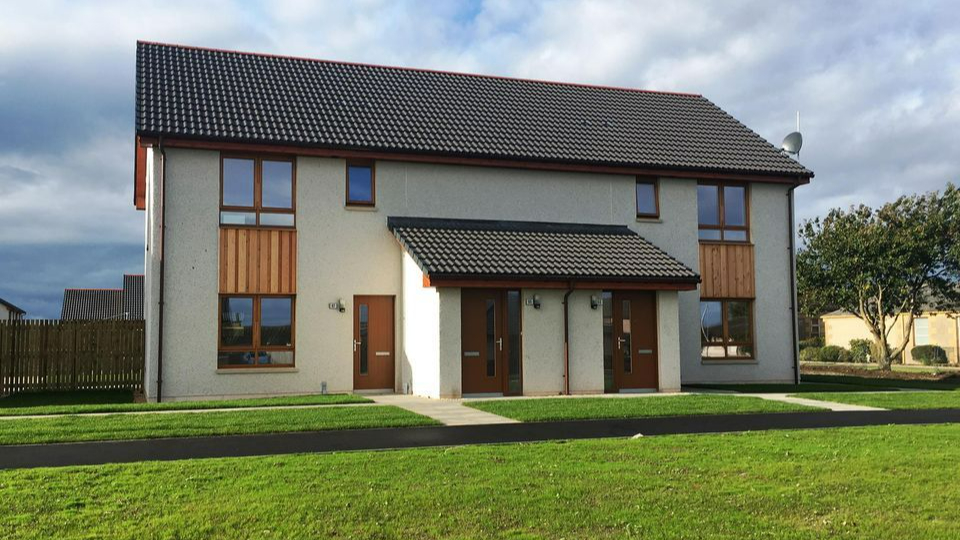Moray Council agrees housing budget for 2025/26

Moray Council has set its Housing Revenue Account (HRA) budget for the 2025/26 financial year in a special meeting of full council on 26 February 2025.
The proposed budget outlines key financial plans and adjustments aimed at maintaining and enhancing council housing services.
Amongst the key decisions, the HRA expenditure budget for 2025/26 is £28.8 million, dedicated to the management, maintenance, and repair of council housing stock. A 6% annual increase in council house rents has been agreed for the next three years (2025/26, 2026/27, and 2027/28) to support ongoing housing services and investments.
Similar to housing rents, there is to be a 6% annual increase for garage and garage site rents over the same three-year period.
In addition, £12.117m has been budgeted for the new build programme plus £2m for acquisitions.
These proposals are part of the council’s commitment to ensuring the sustainability and quality of housing services in the region. The planned rent increases are designed to balance the need for investment in housing infrastructure with affordability considerations for tenants.
Since last year’s budget was set, council housing stock was increased by 26 homes in Keith, which are due for completion within the coming weeks, a further five properties were purchased from the open market and several others will be completed in the weeks ahead. Meanwhile, two trust properties at Ladyhill have been refurbished with both under occupation by next month.
The full HRA budget details are on the Moray Council website.
Chair of Moray Council’s Housing and Community Safety Committee, Cllr Amber Dunbar, said: “The council has made considerable progress as a strategic housing authority and landlord over the past year.
“Our management of homelessness stands out as an area of success. By prioritising prevention, the number of households losing their accommodation in the area has reduced and the prioritisation of families for prompt rehousing has minimised the number of children placed in temporary accommodation. The council’s management of rent arrears continues to improve and we are on track to rank amongst the best performing local authority landlords in Scotland.
“Our primary challenge, and the key focus of this year’s service enhancements, has been stock improvement. We’ve nearly completed an extensive programme of electrical certification and have implemented energy efficiency and other improvement measures across more than a thousand council homes. The scale of these efforts should not be underestimated and the considerable investment in windows, kitchens and bathrooms to improve the quality of homes is welcomed.
“I would like to emphasise that with the rent increase, Moray’s rents will remain amongst the lowest in Scotland. And this approach provides both the financial resources needed to maintain and improve our housing stock, whilst providing a level of certainty over the next three years for our tenants.”
Full budget to bridge funding gaps and sustain community services
Moray Council also approved its full budget for 2025/26, focusing on enhancing community services and continuing transformation to address financial challenges.
To support essential services, the council has agreed to a 10% increase in Council Tax for 2025/26, with indicative rises of 10% for 2026/27 and 6% for 2027/28.
Budgeted funding from the Scottish Government and UK Government in the form of grants and non-domestic rates distribution totals just under £236.9m, which makes up around 80% of Moray Council’s budget.
Around £7.5m of savings have been agreed in total as part of the budget setting process. These have been achieved through efficiencies designed to improve service delivery across the region as the council continues its work to become more sustainable through long-term change.
The approved budget sets total expenditure at £294.197m for 2025/26. This includes £4.704m allocated for budget pressures in the upcoming year, including the increase in employers National Insurance Contributions; heating maintenance contracts; supply teachers required; and cyber security mitigation. A programme of digitisation is included to facilitate transformation and continued improvement.
One of the continuing priorities for the council is tackling poverty through investment in educational attainment. In this budget year, £560,000 will be used to create an Intervention Fund for schools to target identified areas for improvement with a view to raising attainment.
Up to £250,000 will be invested in developing workforce changes to ensure pay and conditions are modernised and a comprehensive review of structures across services will contribute towards an efficient and affordable workforce.
Elsewhere, Library co-location proposals will be developed with an allocation of £90,000 and £143,000 will be released for climate-related projects.
A provision of £6.3m is made for pay awards and other inflationary increases, with new burdens created by legislation requiring £4.6m, including increased payment to external ELC providers; additional funding for out of area learning; extension of provision of free school meals in primary schools; children’s mental health care; and children’s social care and adult health and social care Real Living Wage increases.
Moray Integration Joint Board (MIJB) decides how the Health and Social Care Moray budget is used, however the responsibility for setting the budget to be transferred sits with the council. It has designated £89.012m to the MIJB to support integrated services that are crucial to the well-being of Moray residents.
Council leader, Cllr Kathleen Robertson, said after full council set the budget: “I’m pleased that we’ve continued with our collegiate approach across the year to many issues including budget setting and financial processes. During the past year, both elected members and officers have been engaged behind the scenes discussing budget savings options and prioritising transformation of services. These discussions have been robust and productive as seen in the political agreement we have reached in the majority of the budget savings and in our overall approach to balancing the council’s budget.
“For the first time in many years, we will be able to balance our budget without the need for using unallocated reserves. The Accounts Commission had highlighted that the use of unearmarked reserves was unsustainable and the collaborative work in the budget setting exercises have assisted us in addressing their concern.
“The council acknowledges the challenging economic environment for everyone and I’d highlight that the council also faces these challenges in terms of the increasing cost of providing services. Despite these challenges, the council remains committed to prudent financial management and long-term planning to ensure the sustainability of services for Moray residents. This involves continuing our path of transformation without compromising our ambition for improvement.
“As we continue to prioritise transparency and community involvement in our financial planning, I would encourage residents to stay informed and get involved in ongoing discussions about the future of local services.”








